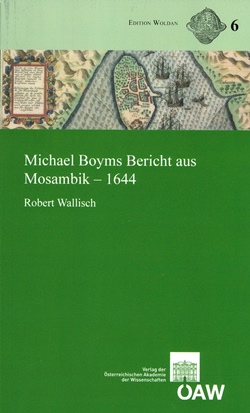

Die Monsunwinde hielten 1644 den polnischen Chinamissionar Michal Piotr Boym für einige Monate im südostafrikanischen Mosambik zurück. Sein bisher unedierter Reisebericht über dieses „Land der Kaffern“ ist nicht nur eine wichtige Quelle für die lokale Geschichte des frühneuzeitlichen Mosambik, sondern entfaltet seine Bedeutung vor allem in Boyms ungewöhnlicher Kritik am portugiesischen Kolonialismus, die der Jesuit Boym konsequent aus der Grundhaltung seines Ordens entwickelt hat. Die innereuropäischen Aspekte dieser Kolonialkritik Boyms liefern darüber hinaus auch ein wichtiges Zeugnis für einen Paradigmenwechsel im Abendland des späten sechzehnten und frühen siebzehnten Jahrhunderts, als die Überseereiche der iberischen Entdecker unter dem Druck nordwesteuropäischer Mächte einbrachen und die Führungsrolle des italo-iberischen, mediterranen Kulturraums ihr Ende fand. Die vorliegende Arbeit stellt die erste wissenschaftliche Edition dieses kurzen lateinischen Textes mit Übersetzung und Kommentar zur Verfügung.
…
For several months of 1644, monsoon winds held the Pole Michael Boym, the great China missionary, in Mozambique off the coast of southeastern Africa. His report, published here for the first time, about the "Country of the Kaffirs" represents not only an important source for the local history of early modern Mozambique, but it’s significance can also be seen particularly in Boym`s unusual criticism of the Portuguese colonial administration, a criticism that developed out of the basic concepts of his religious order, the Society of Jesus. Furthermore, the inner-European aspects of his disapproval of Portuguese colonialism provide interesting testimony for the fundamental changes in Western European society in the late 16th and early 17th centuries, during which the overseas empires of the Iberian discoveries were breaking down under the pressure of Northwest European powers, and the cultural hegemony of the Italo-Iberian civilisation was moving to its end.
2005
978-3-7001-3488-6
978-3-7001-3936-2
132 Seiten,
24x17 cm, broschiert